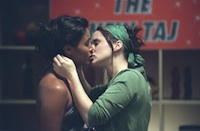‘Coming out’ in the diasporic family
What Wei-Wei and Simon in The Wedding Banquet (Ang Lee, 1993), Omar and Johnny in My Beautiful Laundrette (Stephen Frears, 1985), Nazir and his white British hairdresser boyfriend in East Is East (Damien O’Donnell, 1999), Lola, Murat and Bili in Lola and Bilidikid, Alim and Giles in Touch of Pink (Iqbal Rashid, 2004), Nina and Lisa in Nina’s Heavenly Delights and Emrah and Tim in Evet, ich will! (Evet, I Do!, Sinan Akkus, 2008) have in common is that they are involved in a homosexual or lesbian relationship, in most cases with a partner who belongs to the majority culture, and that their families do not know anything about it until their secret is revealed.
I have often been wondering why the 'coming out' of queer sons and daughters is such a prominent theme in diasporic family films. Without wanting to suggest that I can provide a straightforward answer, I’d like to put forward a few hypotheses here.
The proliferation of queer diasporic identities in contemporary diasporic cinema, in Europe and beyond, can be attributed to the liberating power afforded by the ‘diaspora space’, which, as Avtar Brah contends in Cartographies of Diaspora, is a conceptual space ‘where multiple subject positions are juxtaposed, contested, proclaimed, disavowed; where the permitted and the prohibited perpetually interrogate; and where the accepted and the transgressive imperceptibly mingle even while […being] disclaimed in the name of purity and tradition’ (Brah 1996). Set free by the sexual permissiveness and the liberal public spheres of Western host societies, a significant number of diasporic filmmakers have readily embraced the opportunity to represent LGBT identities in their films. They have broached taboos and made films that would probably have struggled to attract funding in the context of their host societies. Yet these diasporic filmmakers are not primarily or solely concerned with challenging the homophobia of their own communities. As Partibha Parmar wrote in Queer Looks in 1993, i.e. at a time when she made films that are overtly feminist, queer and aesthetically less mainstream than Nina’s Heavenly Delights: ‘as lesbians or gays of color, we have had to constantly negotiate and challenge the racism of the white gay community, and at the same time confront the homophobia of communities of color […]. Precisely because of our lived experiences of racism and homophobia, we locate ourselves not within any one community but in the spaces between these different communities’ (Parmar 1993).
Queer diasporic subjects are doubly different or doubly marginalized and therefore lend themselves particularly well to the identity discourses of diasporic cinema with its emphasis on marginality. The conjoining of these particular identity categories is not coincidental: queerness and diaspora are both defined by a minority status and awareness. One of the shared concerns of queer and ethnic minorities is the extent to which they enjoy full and equal citizenship. Furthermore, the (often traumatic) experience of separation and loss of home and homeland, by many scholars regarded as constitutive of the diaspora experience, is shared by gays and lesbians who, when they ‘come out’, risk being ‘cut off from the heterosexual culture of their childhood, which becomes the site of impossible return, the site of impossible memories’ (Fortier 2002). As David L. Eng (1997), Alan Sinfield (2000) and other scholars who examine the intersectionalities of diaspora, ethnicity, sexuality and gender suggest, queer and diasporic subjects share a sense of loss and separation from an original place of belonging and the impetus to build a new home.
Although the ‘queer diaspora’, understood as a minoritarian community of queers, and the ‘queer spaces within ethnically defined diasporas’ (Fortier 2002) are not identical (despite overlapping partially), both constitute a challenge to essentialist notions of the nation and nationalist ideologies. Given that ‘the heterosexual family is the essential building-block in the construction and elevation of the nation’ and given that ‘queer diasporas […] decidedly “propagate” outside of the nation-building narrative’ (Fortier 2002), the queer diaspora as well as queer enclaves within ethnically defined diasporas challenge nationalist ideologies based on ethnic and cultural homogeneity which have traditionally underpinned the idea of the nation-state. Diasporic citizenship transcends the borders of the nation-state and is characterized by multiple belongings and ambivalent attachments. In Impossible Desires: Queer Diasporas and South Asian Public Cultures, Gayatri Gopinath proposes an interesting equation, namely, that ‘queerness is to heterosexuality as the diaspora is to the nation. If within heteronormative logic the queer is seen as the debased and inadequate of the heterosexual, so too is diaspora within nationalist logic positioned as the queer Other of the nation, its inauthentic imitation’ (2005).
‘Coming out’ in the diasporic family articulates a critique of fantasies of purity, which underpin nationalist and other essentialising ideologies. The family as the most important unit of social and cultural reproduction functions as a trope of belonging, in particular belonging to a nation-state, traditionally imagined as a unified, homogeneous and paternalistic family-like structure. The family is therefore a privileged site where the contested belonging of the over-determined Other (simultaneously queer and diasporic) is negotiated. What marks the queer sons and daughters as Other in the context of the diasporic family, which is Other itself in relation to the majority culture of the host society, is not their ethnicity but their queerness.
I am exploring this theme in-depth in a journal article (forthcoming in Transnational Cinemas) entitled ‘Queering the Family of Nation: Reassessing Fantasies of Purity, Celebrating Hybridity in Diasporic Cinema’.
Edited on 22 Aug 2011 around 12pm
Category: Films


